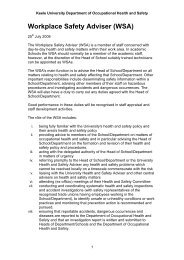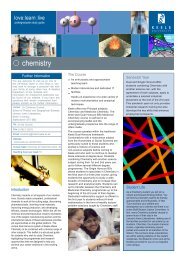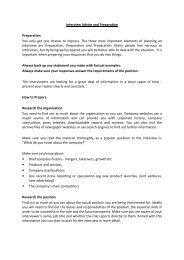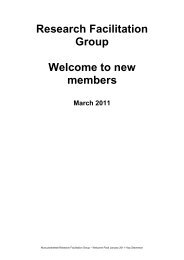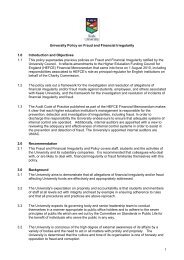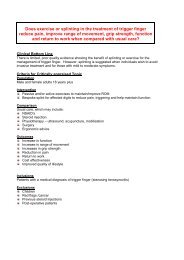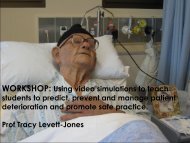NHS guide to Careers in Midwifery - Keele University
NHS guide to Careers in Midwifery - Keele University
NHS guide to Careers in Midwifery - Keele University
You also want an ePaper? Increase the reach of your titles
YUMPU automatically turns print PDFs into web optimized ePapers that Google loves.
<strong>Careers</strong> <strong>in</strong> midwifery<br />
Jo<strong>in</strong> the team and<br />
make a difference
Welcome <strong>to</strong> the <strong>NHS</strong><br />
The <strong>NHS</strong> offers a huge range of excit<strong>in</strong>g and challeng<strong>in</strong>g opportunities for people who<br />
are passionate about mak<strong>in</strong>g a difference.<br />
With more than 300 different careers on offer, there is a job for you no matter what<br />
your skills, <strong>in</strong>terests or qualifications.<br />
What’s more, you’ll be given every opportunity <strong>to</strong> build on your skills and learn new<br />
ones as part of the <strong>Careers</strong> Framework – a system that demonstrates our commitment<br />
<strong>to</strong> skills development. See pages 8 and 9 for more <strong>in</strong>formation about this.<br />
Scientists, accountants, midwives, porters, psychologists, nurses, <strong>in</strong>formation<br />
technologists and estate managers, <strong>to</strong> name but a few, are all needed <strong>to</strong> ensure the<br />
smooth runn<strong>in</strong>g of the <strong>NHS</strong>. These people, and many more, work <strong>to</strong>gether as a team<br />
<strong>to</strong> deliver the very best care for our patients.<br />
To f<strong>in</strong>d out more about becom<strong>in</strong>g a member of the <strong>NHS</strong> team, call 0845 60 60 655,<br />
email advice@nhscareers.nhs.uk or visit www.nhscareers.nhs.uk<br />
We look forward <strong>to</strong> hear<strong>in</strong>g from you!<br />
Contents<br />
2 The <strong>NHS</strong> – a reward<strong>in</strong>g place <strong>to</strong> work<br />
Benefits<br />
Pay and conditions<br />
Work-life balance<br />
6 Your career as a midwife<br />
11 Gett<strong>in</strong>g started<br />
16 Future career options<br />
18 What’s your next step?<br />
8 Career Framework<br />
Develop<strong>in</strong>g your career <strong>in</strong> the <strong>NHS</strong>
Foreword<br />
Midwives often describe their job as ‘privileged’. The<br />
role they have <strong>in</strong> prepar<strong>in</strong>g women for the delivery of<br />
new life makes them a vital presence dur<strong>in</strong>g all stages<br />
of pregnancy, labour and the early postnatal period.<br />
As well as the satisfaction it br<strong>in</strong>gs, this unique role is<br />
demand<strong>in</strong>g and carries plenty of responsibility. More<br />
midwives now work <strong>in</strong> the community, provid<strong>in</strong>g<br />
services <strong>in</strong> women’s homes, local cl<strong>in</strong>ics, children’s<br />
centres and GP surgeries. There is of course the<br />
option <strong>to</strong> be hospital based, where there are plenty<br />
of opportunities for midwives <strong>to</strong> work on antenatal,<br />
labour and postnatal wards and neonatal units.<br />
Becom<strong>in</strong>g a midwife means undertak<strong>in</strong>g professional<br />
education at degree level. Some midwives are<br />
qualified nurses who have chosen <strong>to</strong> change career<br />
direction and undertake the extra study necessary <strong>to</strong><br />
be registered as a midwife. Others beg<strong>in</strong> their career<br />
by work<strong>in</strong>g their way up via a range of routes (for<br />
example from support roles, which require no<br />
qualifications) before go<strong>in</strong>g on <strong>to</strong> study for a registered<br />
midwifery degree. Some beg<strong>in</strong> their midwifery career<br />
after a first career <strong>in</strong> an unrelated field.<br />
Once you have jo<strong>in</strong>ed the <strong>NHS</strong> you’ll enjoy flexible<br />
work<strong>in</strong>g conditions, excellent benefits and a wealth<br />
of opportunities <strong>to</strong> develop your career. There are<br />
few professions that offer so much <strong>in</strong> terms of job<br />
satisfaction and support, as well as giv<strong>in</strong>g you the<br />
chance <strong>to</strong> enhance people’s lives dur<strong>in</strong>g their times<br />
of need.<br />
The <strong>NHS</strong> <strong>Careers</strong> team<br />
For more <strong>in</strong>formation about work<strong>in</strong>g as a<br />
midwife <strong>in</strong> the <strong>NHS</strong>, please visit<br />
www.nhscareers.nhs.uk/list/work<strong>in</strong>g<br />
If you have any questions, call our<br />
helpl<strong>in</strong>e on 0845 60 60 655 or email<br />
advice@nhscareers.nhs.uk
2<br />
<strong>Careers</strong> <strong>in</strong> midwifery<br />
The <strong>NHS</strong> – a reward<strong>in</strong>g place <strong>to</strong> work<br />
There are few careers as reward<strong>in</strong>g as one <strong>in</strong> the <strong>NHS</strong>, or that give you the opportunity <strong>to</strong> work<br />
with such a wide variety of people.<br />
We actively recruit people of all ages, backgrounds<br />
and levels of experience. This helps us understand<br />
the different needs of the patients we serve every<br />
day and provide the best possible service.<br />
Whichever area you jo<strong>in</strong>, you become part of a<br />
talented, passionate team of people – committed <strong>to</strong><br />
provid<strong>in</strong>g the best care and treatment <strong>to</strong> patients.<br />
You will also enjoy one of the most competitive and<br />
flexible benefits packages offered by any employer <strong>in</strong><br />
the UK.<br />
Benefits of work<strong>in</strong>g <strong>in</strong> the <strong>NHS</strong><br />
Everyone who jo<strong>in</strong>s the <strong>NHS</strong> is guaranteed a salary<br />
that matches their ability and responsibilities, and<br />
given every opportunity <strong>to</strong> <strong>in</strong>crease it through<br />
tra<strong>in</strong><strong>in</strong>g and development.<br />
On <strong>to</strong>p of your basic salary, you will receive at least<br />
27 days’ holiday each year, plus a range of other<br />
benefits, <strong>in</strong>clud<strong>in</strong>g occupational health and<br />
counsell<strong>in</strong>g services.<br />
Jo<strong>in</strong> one of the UK’s best pension schemes<br />
The <strong>NHS</strong> Pension Scheme is one of the most<br />
generous and comprehensive <strong>in</strong> the UK. Every new<br />
employee au<strong>to</strong>matically becomes a member and you<br />
will get an excellent package of pension benefits,<br />
fully protected aga<strong>in</strong>st <strong>in</strong>flation and guaranteed by<br />
the government.<br />
For more <strong>in</strong>formation about the pension, and<br />
a full list of the benefits <strong>in</strong>cluded, please visit<br />
www.nhscareers.nhs.uk/list/payandbenefits<br />
PAY AND CONDITIONS<br />
The <strong>NHS</strong> pay system, known as Agenda for<br />
Change, offers real benefits for all directly<br />
employed staff except doc<strong>to</strong>rs, dentists and very<br />
senior managers, <strong>in</strong>clud<strong>in</strong>g:<br />
• a standard work<strong>in</strong>g week of 37.5 hours<br />
• holiday entitlement of 27 days a year, plus eight<br />
general and public holidays, ris<strong>in</strong>g <strong>to</strong> 33 days<br />
after 10 years of service<br />
• new pay enhancements <strong>to</strong> reward out of hours,<br />
shift and overtime work<strong>in</strong>g<br />
• better career and pay progression based on the<br />
application of knowledge and skills<br />
• annual personal development review <strong>to</strong> support<br />
career aspirations.<br />
Other benefits of work<strong>in</strong>g <strong>in</strong> the <strong>NHS</strong> <strong>in</strong>clude<br />
tra<strong>in</strong><strong>in</strong>g, occupational health services, au<strong>to</strong>matic<br />
membership of the <strong>NHS</strong> Pension Scheme (unless<br />
you choose <strong>to</strong> opt out) and study leave for<br />
sponsored courses.<br />
To f<strong>in</strong>d out more about the different Agenda<br />
for Change pay bands, and see the most up-<strong>to</strong>date<br />
start<strong>in</strong>g salaries for each one, please visit<br />
www.nhscareers.nhs.uk/list/payandbenefits<br />
You can also order a copy of this year’s pay<br />
leaflet by call<strong>in</strong>g our helpl<strong>in</strong>e on<br />
0845 60 60 655, or email<strong>in</strong>g<br />
advice@nhscareers.nhs.uk
telephone 0845 60 60 655 email advice@nhscareers.nhs.uk <strong>Careers</strong> <strong>in</strong> midwifery 3<br />
FULFIL YOUR POTENTIAL<br />
• The <strong>NHS</strong> is committed <strong>to</strong> offer<strong>in</strong>g<br />
development and learn<strong>in</strong>g opportunities for<br />
all full-time and part-time staff<br />
• No matter where you start with<strong>in</strong> the <strong>NHS</strong>,<br />
you’ll have access <strong>to</strong> extra tra<strong>in</strong><strong>in</strong>g and be<br />
given every chance <strong>to</strong> progress with<strong>in</strong> the<br />
organisation<br />
• You will receive an annual personal review<br />
and development plan <strong>to</strong> support your<br />
career progression<br />
• You will be encouraged <strong>to</strong> extend your range<br />
of skills and knowledge and take on new<br />
responsibilities through the Knowledge and<br />
Skills Framework.<br />
See pages 8 and 9 for more on the Career<br />
Framework and examples of how other<br />
employees have progressed through<br />
the <strong>NHS</strong>.
4<br />
<strong>Careers</strong> <strong>in</strong> midwifery<br />
CASE STUDY<br />
Name: Melv<strong>in</strong> Wilk<strong>in</strong>son<br />
Job title: labour ward lead/manager, Lewisham Hospital <strong>NHS</strong> Trust, south London<br />
Entry route: after work<strong>in</strong>g as a registered nurse<br />
Melv<strong>in</strong> was a bus<strong>in</strong>ess studies student when<br />
a friend who worked as an A&E nurse<br />
encouraged him <strong>to</strong> look <strong>in</strong><strong>to</strong> nurs<strong>in</strong>g because<br />
he asked so many questions about her job. He<br />
subsequently tra<strong>in</strong>ed <strong>to</strong> become a midwife.<br />
As a nurse, I worked <strong>in</strong> various medical wards for<br />
a year but I enjoyed obstetrics most, so I decided<br />
<strong>to</strong> embark on a midwifery course. I studied for a<br />
diploma <strong>in</strong> midwifery and have never looked back<br />
– I’ve just kept tak<strong>in</strong>g on more roles and do<strong>in</strong>g<br />
more studies.<br />
After qualify<strong>in</strong>g, I worked as a bank midwife at<br />
St Hellier Hospital, Surrey, while study<strong>in</strong>g for a<br />
degree <strong>in</strong> health service management. I then<br />
spent a further three years as a senior midwife.<br />
I then moved <strong>in</strong><strong>to</strong> a charge midwife post,<br />
where I co-ord<strong>in</strong>ated services at ward level<br />
and <strong>to</strong>ok on other challenges <strong>in</strong> theatre –<br />
scrubb<strong>in</strong>g for Caesarean sections and so on.<br />
My role is that of labour ward lead/ward<br />
manager. My job is twofold – a ward manager<br />
for three days plus two days’ hands-on<br />
cl<strong>in</strong>ical work.<br />
To be a midwife, you need <strong>to</strong> have a friendly,<br />
gentle approach, be m<strong>in</strong>dful of <strong>in</strong>dividual<br />
women’s needs and respect their cultures. You<br />
need <strong>to</strong> always have the woman’s wishes at<br />
heart, especially where she has a birth plan.<br />
I am very open when I approach patients, and<br />
have delivered patients from different religions<br />
and cultures. If a woman prefers a female<br />
midwife, then that’s f<strong>in</strong>e and her choice must<br />
be respected.<br />
Dur<strong>in</strong>g my career, on a few occasions, I’ve<br />
been <strong>in</strong> a labour ward where women have<br />
requested <strong>to</strong> be attended by male practitioners<br />
only. On one occasion my be<strong>in</strong>g there<br />
encouraged a partner <strong>to</strong> stay and witness his<br />
child be<strong>in</strong>g born. His expression was, “thank<br />
goodness for your presence, I thought I was<br />
go<strong>in</strong>g <strong>to</strong> be the only man <strong>in</strong> this room”.<br />
The rewards are brilliant – it is always lovely <strong>to</strong><br />
be there when a baby is born and see the<br />
parents very happy. That personal fulfilment,<br />
hav<strong>in</strong>g helped a mother <strong>to</strong> give birth, is<br />
tremendous. It is very reward<strong>in</strong>g <strong>to</strong> be with<br />
families at such an eventful time.
telephone 0845 60 60 655 email advice@nhscareers.nhs.uk <strong>Careers</strong> <strong>in</strong> midwifery 5<br />
Help<strong>in</strong>g you f<strong>in</strong>d the right work-life balance<br />
As an <strong>NHS</strong> employee, you can benefit from flexible<br />
work<strong>in</strong>g, childcare, and high standards of equality<br />
and diversity thanks <strong>to</strong> the Improv<strong>in</strong>g Work<strong>in</strong>g Lives<br />
(IWL) <strong>in</strong>itiative.<br />
S<strong>in</strong>ce its <strong>in</strong>troduction <strong>in</strong> 2000, the programme has<br />
helped br<strong>in</strong>g about a real culture change with<strong>in</strong> the<br />
<strong>NHS</strong> – reduc<strong>in</strong>g stress, <strong>in</strong>creas<strong>in</strong>g motivation and<br />
improv<strong>in</strong>g productivity among staff. All these fac<strong>to</strong>rs<br />
have led <strong>to</strong> higher levels of patient care.<br />
As well as advice and support for people look<strong>in</strong>g<br />
after sick or elderly relatives, we provide a range of<br />
childcare services for <strong>NHS</strong> employees, <strong>in</strong>clud<strong>in</strong>g:<br />
• nursery care<br />
• after-school and breakfast clubs<br />
• holiday play schemes<br />
• emergency care.<br />
Get more <strong>in</strong>formation about the benefits<br />
and opportunities offered by the <strong>NHS</strong> at<br />
www.nhscareers.nhs.uk/list/payandbenefits<br />
You can f<strong>in</strong>d more <strong>in</strong>formation about the<br />
<strong>in</strong>itiative and the plans for the future at<br />
www.nhsemployers.org/excellence<br />
Manag<strong>in</strong>g your commitments <strong>in</strong> and out<br />
of work<br />
The size and diversity of the <strong>NHS</strong> means we can offer<br />
you a range of flexible work<strong>in</strong>g opportunities.<br />
Part-time roles and jobshare opportunities are often<br />
available, as well as term-time only, even<strong>in</strong>g and<br />
weekend positions. We will do everyth<strong>in</strong>g we can <strong>to</strong><br />
help you comb<strong>in</strong>e your work for us with<br />
commitments <strong>in</strong> your life outside work – whether<br />
you’re study<strong>in</strong>g for a new qualification, rais<strong>in</strong>g a<br />
family or juggl<strong>in</strong>g other responsibilities.<br />
Many people <strong>in</strong> the <strong>NHS</strong> take an extended break <strong>to</strong><br />
look after young children or other dependents who<br />
need special care, or <strong>to</strong> study full time.<br />
We will help you comb<strong>in</strong>e your<br />
work for us with commitments<br />
<strong>in</strong> your everyday life
6<br />
<strong>Careers</strong> <strong>in</strong> midwifery<br />
Your career as a midwife<br />
The care and expertise provided by midwives is<br />
<strong>in</strong>valuable <strong>to</strong> the thousands of women and<br />
their families who use their services <strong>in</strong> <strong>NHS</strong><br />
cl<strong>in</strong>ics, hospitals and at home while pregnant,<br />
throughout labour and dur<strong>in</strong>g the period after<br />
a baby’s birth.<br />
As a midwife, you’ll ma<strong>in</strong>ly deal with women who<br />
are healthy but require professional support and<br />
advice <strong>to</strong> help them throughout pregnancy. If there<br />
are no complications, you will be the ma<strong>in</strong> health<br />
professional contact for a woman, help<strong>in</strong>g her make<br />
<strong>in</strong>formed choices about the options and services<br />
available dur<strong>in</strong>g pregnancy.<br />
Midwives work as part of a multidiscipl<strong>in</strong>ary<br />
healthcare team that <strong>in</strong>cludes hospital doc<strong>to</strong>rs, GPs,<br />
other midwives, neonatal nurses and support staff<br />
but you could also work alone. Midwives are experts<br />
and lead other healthcare professionals dur<strong>in</strong>g<br />
normal childbirth. The responsibilities of midwives are<br />
diverse. You’ll provide full antenatal care <strong>in</strong>clud<strong>in</strong>g<br />
classes, cl<strong>in</strong>ical exam<strong>in</strong>ations and screen<strong>in</strong>g, identify<br />
high-risk pregnancies, moni<strong>to</strong>r women and support<br />
them dur<strong>in</strong>g labour and the birth<strong>in</strong>g process. You will<br />
also teach women – particularly new mothers – how<br />
<strong>to</strong> feed and bathe their babies before hand<strong>in</strong>g over<br />
care <strong>to</strong> a health visi<strong>to</strong>r after around one month<br />
follow<strong>in</strong>g the baby’s birth.<br />
As a midwife’s client base <strong>in</strong>cludes women from all<br />
walks of life, you will be confident enough <strong>to</strong><br />
communicate with all types of people. Some women<br />
and their families will be from challeng<strong>in</strong>g<br />
backgrounds – they may be homeless, socially<br />
excluded, have disabilities or be very young, <strong>in</strong> which<br />
case you may liaise with social services. Other clients<br />
may be from certa<strong>in</strong> cultural or religious backgrounds<br />
where high levels of empathy and <strong>in</strong>tuition are just as<br />
important. Regardless of background, all women will<br />
need their midwife <strong>to</strong> understand the emotional,<br />
physical and psychological processes of pregnancy<br />
and birth.<br />
When pregnancies do not go <strong>to</strong> plan, it will be up <strong>to</strong><br />
you <strong>to</strong> offer support and advice follow<strong>in</strong>g events<br />
such as stillbirth, miscarriage, term<strong>in</strong>ation, neonatal<br />
death and neonatal abnormalities. Often, midwives –<br />
especially those based <strong>in</strong> the community – can<br />
develop good professional relationships with their<br />
clients due <strong>to</strong> the cont<strong>in</strong>uity of care <strong>in</strong>volved, which<br />
makes counsell<strong>in</strong>g easier at difficult times.<br />
By its nature, midwifery is not a n<strong>in</strong>e-<strong>to</strong>-five job.<br />
Midwives usually work on an on-call rota so that they<br />
can provide 24-hour care, at the woman’s home as<br />
well as <strong>in</strong> hospital.<br />
Women-centred care<br />
As midwifery services are <strong>in</strong>creas<strong>in</strong>gly moved from<br />
hospital <strong>to</strong> community, the sett<strong>in</strong>gs <strong>in</strong> which you<br />
could work will reflect this. Some midwives, however,<br />
will choose <strong>to</strong> rema<strong>in</strong> work<strong>in</strong>g <strong>in</strong> hospital maternity<br />
units – antenatal, labour and postnatal wards – while<br />
others will work <strong>in</strong> community and GP cl<strong>in</strong>ics, and<br />
birth<strong>in</strong>g centres.<br />
There is an <strong>in</strong>creas<strong>in</strong>g trend for midwives <strong>to</strong> work as<br />
part of a team, follow<strong>in</strong>g their clients from the day<br />
they become pregnant through <strong>to</strong> the birth of their<br />
child, or manag<strong>in</strong>g a caseload of clients <strong>in</strong> a specific<br />
geographic area.<br />
For <strong>in</strong>formation about the qualifications<br />
needed <strong>to</strong> work <strong>in</strong> midwifery, see the<br />
‘Gett<strong>in</strong>g started’ section on page 11 or visit<br />
www.nhscareers.nhs.uk/list/qualifications<br />
You will be the ma<strong>in</strong> health<br />
professional contact for a woman,<br />
help<strong>in</strong>g her make <strong>in</strong>formed choices<br />
about the options and services<br />
available dur<strong>in</strong>g pregnancy
telephone 0845 60 60 655 email advice@nhscareers.nhs.uk <strong>Careers</strong> <strong>in</strong> midwifery 7<br />
CASE STUDY<br />
Name: Alison Me<strong>in</strong>el<br />
Job title: Sure Start midwife, St Mary’s <strong>NHS</strong> Trust, north London<br />
Entry route: after work<strong>in</strong>g as a registered nurse<br />
Alison worked as a nurse for a year before<br />
apply<strong>in</strong>g <strong>to</strong> do a degree <strong>in</strong> midwifery. She<br />
says the variety of opportunities for <strong>NHS</strong><br />
midwives can be daunt<strong>in</strong>g but allowed her<br />
<strong>to</strong> direct her own career path.<br />
When I first qualified, I worked on wards –<br />
postnatal, antenatal and labour wards – and <strong>in</strong><br />
cl<strong>in</strong>ic. I then helped with the formation of a<br />
caseload team that focused on the community.<br />
After tak<strong>in</strong>g someone on at book<strong>in</strong>g, we did all<br />
their antenatal visits, and were on call for them<br />
when they went <strong>in</strong><strong>to</strong> labour, so it was 24 hours a<br />
day, seven days a week. I worked with a partner<br />
so one of us was always available.<br />
I did that for two or three years and worked<br />
quite closely with a Sure Start midwife, which<br />
is how I got <strong>to</strong> know about the scheme. It’s a<br />
government programme that br<strong>in</strong>gs <strong>to</strong>gether,<br />
early education, childcare, health and family<br />
support. I applied for a post when one<br />
became vacant. My role now is based with<strong>in</strong> a<br />
children’s centre, where I run antenatal<br />
classes, aqua-natal classes, baby massage<br />
classes and a support group for antenatal and<br />
postnatal women so they can meet <strong>in</strong>formally.<br />
I also do outreach work with those <strong>in</strong><br />
temporary accommodation – such as travellers<br />
– who may have been missed by the system.<br />
I do postnatal support visits, so if somebody<br />
lives <strong>in</strong> our area and just wants <strong>to</strong> have a chat<br />
with a midwife, I am there rather than them<br />
hav<strong>in</strong>g <strong>to</strong> wait for an appo<strong>in</strong>tment.<br />
There are many different avenues you can go<br />
down depend<strong>in</strong>g on your special <strong>in</strong>terests.<br />
When I started this job, I was given a blank<br />
piece of paper and it was up <strong>to</strong> me <strong>to</strong> get on<br />
with it – great <strong>in</strong> some ways but daunt<strong>in</strong>g <strong>in</strong><br />
others. You have <strong>to</strong> be really self-directed<br />
and motivated.<br />
It’s the sort of job that you can’t enter lightly<br />
– it is often called a vocation – but on the<br />
plus side there are not many other jobs where<br />
you can get this k<strong>in</strong>d of satisfaction, where<br />
someone looks <strong>in</strong><strong>to</strong> your eyes and says “thank<br />
you”, and you know that you’ve helped them<br />
on that journey. It isn’t just about deliver<strong>in</strong>g<br />
babies, it is so much more.
8<br />
<strong>Careers</strong> <strong>in</strong> midwifery<br />
Career Framework<br />
The Career Framework has been designed <strong>to</strong><br />
improve career development and job<br />
satisfaction for <strong>NHS</strong> employees.<br />
It encourages <strong>in</strong>dividuals <strong>to</strong> learn new skills and take<br />
on extra responsibilities that enable them <strong>to</strong> progress<br />
with<strong>in</strong> the organisation. Many people take on<br />
additional responsibility with<strong>in</strong> their own area, while<br />
others retra<strong>in</strong> and move <strong>in</strong> <strong>to</strong> different roles.<br />
The case study on page 10 describes how Karen Baker<br />
has progressed with<strong>in</strong> the <strong>NHS</strong>.<br />
Ambulance service<br />
professions<br />
Allied health<br />
professions<br />
Dental care<br />
professions<br />
Healthcare science<br />
9 More senior staff Direc<strong>to</strong>r of therapies Direc<strong>to</strong>r of regional<br />
genetics services<br />
8 Consultant practitioners Consultant radiographer Consultant<br />
cl<strong>in</strong>ical scientist<br />
(medical physics)<br />
7 Advanced practitioners Specialist speech and<br />
language therapist<br />
Specialist respira<strong>to</strong>ry<br />
physiologist<br />
6 Senior practitioners/<br />
specialist practitioners<br />
Emergency care<br />
practitioner<br />
Senior occupational<br />
therapist<br />
Senior dental technologist<br />
Senior biomedical<br />
scientist<br />
5 Practitioners Paramedic Dietitian Dental technician Cardiac physiologist<br />
4 Assistant practitioners/<br />
associate practitioners<br />
Control room duty officer<br />
Assistant cl<strong>in</strong>ical<br />
psychologist<br />
Dental therapist<br />
Critical care technologist<br />
3 Senior healthcare<br />
assistants/technicians<br />
Emergency medical<br />
dispatcher<br />
Rehabilitation assistant Dental hygienist Newborn hear<strong>in</strong>g<br />
screener<br />
2 Support workers Patient transport service<br />
driver<br />
Therapy cl<strong>in</strong>ical support<br />
worker<br />
Dental nurse<br />
Pharmacy dispens<strong>in</strong>g<br />
assistant<br />
1 Initial entry level jobs
telephone 0845 60 60 655 email advice@nhscareers.nhs.uk <strong>Careers</strong> <strong>in</strong> midwifery 9<br />
You can follow her career path <strong>in</strong> the white boxes on<br />
the diagram below, alongside other potential paths<br />
<strong>in</strong> the different areas of the <strong>NHS</strong>.<br />
The diagram below gives an illustration of a variety of<br />
<strong>NHS</strong> <strong>Careers</strong> and where they may fit on the Career<br />
Framework. It is not exhaustive; details on other<br />
careers can be found <strong>in</strong> the relevant booklets and on<br />
the <strong>NHS</strong> careers website.<br />
Visit the <strong>NHS</strong> <strong>Careers</strong> website at<br />
www.nhscareers.nhs.uk/list/work<strong>in</strong>g<br />
Health <strong>in</strong>formatics Management <strong>Midwifery</strong> Nurs<strong>in</strong>g<br />
Wider<br />
healthcare team<br />
Direc<strong>to</strong>r of <strong>in</strong>formation<br />
management and<br />
technology<br />
Direc<strong>to</strong>r of human<br />
resources<br />
Direc<strong>to</strong>r of maternity<br />
services<br />
Direc<strong>to</strong>r of nurs<strong>in</strong>g<br />
Pictures archiv<strong>in</strong>g<br />
communication manager<br />
Divisional direc<strong>to</strong>r of<br />
operations for<br />
unscheduled care:<br />
strategic leadership<br />
and management of<br />
emergency care, elderly<br />
care, cancer care and<br />
medic<strong>in</strong>e<br />
Consultant midwife<br />
Nurse consultant <strong>in</strong> stroke<br />
Cl<strong>in</strong>ical researcher<br />
General manager:<br />
maternity, gynaecology<br />
and fertility service:<br />
develop<strong>in</strong>g and<br />
manag<strong>in</strong>g <strong>in</strong>tegrated<br />
midwifery services<br />
between the community<br />
and the hospital sec<strong>to</strong>rs<br />
Head of midwifery<br />
District nurse (team<br />
manager)<br />
Head of estates<br />
Systems analyst Project manager Delivery suite manager:<br />
support<strong>in</strong>g mothers<br />
dur<strong>in</strong>g labour, deliver<strong>in</strong>g<br />
their babies and<br />
manag<strong>in</strong>g a small team<br />
Community psychiatric<br />
nurse<br />
Chapla<strong>in</strong><br />
Librarian Payroll manager Midwife Staff nurse: provid<strong>in</strong>g<br />
nurs<strong>in</strong>g care <strong>to</strong> patients<br />
<strong>in</strong> hospital<br />
Cater<strong>in</strong>g manager<br />
Cl<strong>in</strong>ical coder General office manager Community care assistant Medical secretary<br />
Medical records clerk Maternity support worker Senior healthcare<br />
assistant<br />
Security officer<br />
Support desk assistant<br />
Healthcare assistant<br />
(maternity)<br />
Healthcare assistant<br />
(nurs<strong>in</strong>g)<br />
Ma<strong>in</strong>tenance assistant<br />
Health records assistant Nurse cadet Porter
10<br />
<strong>Careers</strong> <strong>in</strong> midwifery<br />
CASE STUDY<br />
Name: Karen Baker<br />
Job title: divisional direc<strong>to</strong>r of operations for unscheduled care, Southamp<strong>to</strong>n <strong>University</strong> Hospitals<br />
<strong>NHS</strong> Trust<br />
Entry route: nurs<strong>in</strong>g and midwifery course<br />
Karen is the manager responsible for the<br />
emergency department, cancer care and<br />
medic<strong>in</strong>e and elderly care at a major hospital<br />
trust, with more than 1100 staff and a<br />
budget of £62 million.<br />
When I started my career, you had <strong>to</strong> tra<strong>in</strong> as a<br />
nurse before becom<strong>in</strong>g a midwife. But early on I<br />
realised that midwifery appealed <strong>to</strong> me most. You<br />
care holistically for people and the diagnosis and<br />
care plan you prepare is your own work. The<br />
work itself is excit<strong>in</strong>g: you’re help<strong>in</strong>g br<strong>in</strong>g a new<br />
life <strong>in</strong><strong>to</strong> the world. There are emergency<br />
situations that get the adrenal<strong>in</strong> flow<strong>in</strong>g, as well<br />
as complex cases <strong>to</strong> stretch your knowledge and<br />
skills. There’s a lot of fun, <strong>to</strong>o.<br />
I never planned the career I’ve had. I th<strong>in</strong>k I’ve<br />
always wanted <strong>to</strong> do a job <strong>to</strong> the best of my ability,<br />
and when I feel I’ve reached that level thought:<br />
‘what more could I do <strong>to</strong> make a bigger difference?’<br />
I spent ten years <strong>in</strong> a variety of hospital and<br />
community midwifery posts before becom<strong>in</strong>g a<br />
delivery suite manager. S<strong>in</strong>ce then I have been<br />
a head of midwifery services, a general<br />
manager, associate direc<strong>to</strong>r of midwifery and<br />
nurs<strong>in</strong>g services, care group manager for<br />
obstetrics and gynaecology, and divisional<br />
direc<strong>to</strong>r of operations for women and children,<br />
before tak<strong>in</strong>g on my present role.<br />
I have also been a council member with the<br />
Royal College of Midwives, taught on university<br />
courses and been <strong>in</strong>volved <strong>in</strong> various national<br />
policy-mak<strong>in</strong>g and review groups.<br />
I guess I like a challenge – even more as my<br />
career has developed and I have seen the<br />
many challenges posed by advances <strong>in</strong><br />
treatment and ris<strong>in</strong>g expectations. I have been<br />
given the opportunity and support <strong>to</strong> develop<br />
my leadership abilities.<br />
Honestly, I can’t th<strong>in</strong>k of any career that beats<br />
be<strong>in</strong>g <strong>in</strong> the <strong>NHS</strong>. You are work<strong>in</strong>g alongside<br />
amaz<strong>in</strong>g people who are deeply committed <strong>to</strong><br />
what they’re do<strong>in</strong>g. The job satisfaction can’t<br />
be matched. You really are chang<strong>in</strong>g people’s<br />
lives and there are so many different directions<br />
you can take. You’re almost certa<strong>in</strong> <strong>to</strong> f<strong>in</strong>d the<br />
th<strong>in</strong>g that lights you up.<br />
I can’t th<strong>in</strong>k of any career that<br />
beats be<strong>in</strong>g <strong>in</strong> the <strong>NHS</strong>. The<br />
satisfaction can’t be matched
telephone 0845 60 60 655 email advice@nhscareers.nhs.uk <strong>Careers</strong> <strong>in</strong> midwifery 11<br />
Gett<strong>in</strong>g started<br />
To work <strong>in</strong> the <strong>NHS</strong>, midwives must hold a<br />
‘pre-registration’ qualification <strong>in</strong> midwifery at<br />
degree level, which allows them <strong>to</strong> register<br />
with the Nurs<strong>in</strong>g and <strong>Midwifery</strong> Council<br />
(NMC). You can enter the <strong>NHS</strong> at various<br />
levels, and be assured of practical, and<br />
possibly f<strong>in</strong>ancial, support as you progress.<br />
Who can become a midwife?<br />
Some people apply for a place on a full-time preregistration<br />
course after ga<strong>in</strong><strong>in</strong>g good grades at A<br />
level (or equivalent) at school or college.<br />
Others may not possess A levels but will have relevant<br />
work experience – such as time spent as healthcare<br />
assistants or associate practitioners – and be able <strong>to</strong><br />
show evidence of academic ability, which can be<br />
enough <strong>to</strong> meet a university’s requirements.<br />
Qualified nurses can take a shortened pre-registration<br />
course <strong>in</strong> midwifery; the course lasts for 18 months.<br />
Professional tra<strong>in</strong><strong>in</strong>g<br />
Pre-registration programmes <strong>in</strong> midwifery are<br />
provided by universities. All applicants must be<br />
numerate, literate and of good character and good<br />
health. Pre-registration degree courses <strong>in</strong> midwifery<br />
are at least three years long and comprise 50 per<br />
cent academic study and 50 per cent supervised<br />
work placements <strong>in</strong> hospitals and the community.<br />
There are no national standard entry requirements for<br />
midwifery degrees. It is up <strong>to</strong> each university <strong>to</strong><br />
decide what they want <strong>to</strong> accept but on the whole,<br />
degree programmes usually require applicants <strong>to</strong><br />
have five good GCSEs and two A levels (or<br />
equivalent), one of which should preferably be a<br />
science subject.<br />
Accelerated tra<strong>in</strong><strong>in</strong>g for registered nurses<br />
Registered nurses can undertake a 78-week<br />
programme <strong>to</strong> qualify as midwives.<br />
<strong>Midwifery</strong> education <strong>in</strong>volves a mixture of modules of<br />
academic study and placements <strong>in</strong> hospitals and the<br />
community, where you will beg<strong>in</strong> <strong>to</strong> work under the<br />
supervision of qualified healthcare professionals.<br />
Once qualified, midwives are responsible for keep<strong>in</strong>g<br />
their knowledge up <strong>to</strong> date, and have <strong>to</strong> keep the<br />
govern<strong>in</strong>g body, the NMC, <strong>in</strong>formed of their<br />
progress, so that they can rema<strong>in</strong> on the professional<br />
register. If you decide <strong>to</strong> take an extended career<br />
break it is important the registration is not allowed <strong>to</strong><br />
lapse otherwise you will not be able <strong>to</strong> practice.<br />
Whatever your entry route <strong>to</strong> midwifery, you will be<br />
able <strong>to</strong> benefit from the flexibility, support and<br />
learn<strong>in</strong>g opportunities offered by the <strong>NHS</strong> through<br />
all stages of your career.
12<br />
<strong>Careers</strong> <strong>in</strong> midwifery<br />
CASE STUDY<br />
Name: Rachel Cox<br />
Job title: postnatal ward midwife, Southmead Hospital, North Bris<strong>to</strong>l <strong>NHS</strong> Trust<br />
Entry route: direct entry through diploma course<br />
Rachel jo<strong>in</strong>ed a midwifery diploma course<br />
straight after leav<strong>in</strong>g school at the age of 18.<br />
She benefited from excellent men<strong>to</strong>r<strong>in</strong>g and<br />
values the teamwork.<br />
From quite a young age, I’d liked the idea of<br />
be<strong>in</strong>g <strong>in</strong> a hospital and help<strong>in</strong>g people. My<br />
problem was that I wasn’t sure about look<strong>in</strong>g<br />
after people who were actually ill! So I worked<br />
out that the best job for me would be as a<br />
midwife, and set my sights on that.<br />
I got the GCSEs I needed and then <strong>to</strong>ok A levels<br />
that I knew would help me later: biology and<br />
English language. I wanted <strong>to</strong> stay <strong>in</strong> Bris<strong>to</strong>l and<br />
the only course available at the time was a<br />
diploma at the <strong>University</strong> of West of England.<br />
Fortunately, I conv<strong>in</strong>ced the <strong>in</strong>terview panel that<br />
I was committed <strong>to</strong> this career.<br />
In my student group there was only one other<br />
girl my age, all the rest were older. The first<br />
few days on a labour ward felt quite scary.<br />
I was <strong>in</strong> a different world with its own rules<br />
and atmosphere, even its own language, so I<br />
stuck very close <strong>to</strong> my tu<strong>to</strong>rs and men<strong>to</strong>rs who<br />
were excellent. I wanted <strong>to</strong> become like them.<br />
Some of those men<strong>to</strong>rs I now work alongside<br />
as colleagues, which gives me a great sense of<br />
how much I’ve learned and how far I’ve<br />
come. I have added a teach<strong>in</strong>g and assess<strong>in</strong>g<br />
qualification <strong>to</strong> my diploma, and plan <strong>to</strong> step<br />
up <strong>to</strong> degree level soon.<br />
Dur<strong>in</strong>g the diploma course we did placements<br />
<strong>in</strong> the community as well as hospital. After<br />
qualify<strong>in</strong>g five years ago, I opted <strong>to</strong> work on a<br />
hospital labour ward. I like the constant contact<br />
with other healthcare professionals, and the<br />
set shift patterns protect your time outside work.<br />
I’m not the weepy sort but I cried at the first<br />
birth I attended. I don’t do that any more but<br />
the emotional impact is still there every time.<br />
It’s very special. As <strong>in</strong> any job there are<br />
pressures and days when th<strong>in</strong>gs don’t go<br />
right but I’m do<strong>in</strong>g a job I love. To be where<br />
I am now and have this positive feel<strong>in</strong>g about<br />
my job, I’m a very lucky person.<br />
I like the constant contact with<br />
other health professionals, and<br />
the set shift patterns protect<br />
your time outside work
telephone 0845 60 60 655 email advice@nhscareers.nhs.uk <strong>Careers</strong> <strong>in</strong> midwifery 13<br />
Work placements and volunteer<strong>in</strong>g<br />
For those with no experience of work<strong>in</strong>g <strong>in</strong> the<br />
health service, or whose careers have been based <strong>in</strong><br />
non-midwifery environments, it is a good idea <strong>to</strong><br />
spend some time mak<strong>in</strong>g sure that it is the right<br />
career for you.<br />
Secur<strong>in</strong>g a work placement will give you valuable<br />
experience. Also, work placements <strong>in</strong> midwifery<br />
sett<strong>in</strong>gs will give you a chance <strong>to</strong> speak <strong>to</strong> people<br />
who work <strong>in</strong> the profession.<br />
As open<strong>in</strong>gs for midwifery or healthcare work<br />
placements and voluntary roles vary around the<br />
country, it’s best <strong>to</strong> speak <strong>to</strong> your local <strong>NHS</strong> or<br />
voluntary organisations <strong>to</strong> see what’s available.<br />
Support workers/assistant and associate<br />
practitioners<br />
Support workers and healthcare assistants often don’t<br />
need set qualifications <strong>to</strong> do their jobs but ga<strong>in</strong><strong>in</strong>g<br />
experience and appropriate NVQs while work<strong>in</strong>g can<br />
be a stepp<strong>in</strong>g s<strong>to</strong>ne <strong>to</strong> more senior support roles,<br />
such as midwifery support workers and assistant or<br />
associate practitioners, as well as <strong>to</strong> further study if<br />
they wish <strong>to</strong> pursue a career <strong>in</strong> midwifery.<br />
Those who have worked <strong>in</strong> the <strong>NHS</strong> and have the<br />
academic ability <strong>to</strong> cope with the demands of a<br />
professional midwifery course will f<strong>in</strong>d that their<br />
experience is an advantage when they apply for a<br />
place on a midwifery degree, which will normally be<br />
part time and last for five or six years.<br />
For more <strong>in</strong>formation, see our cl<strong>in</strong>ical support<br />
worker factsheet or visit<br />
www.nhscareers.nhs.uk/list/work<strong>in</strong>g<br />
Cadet schemes and apprenticeships<br />
Cadet schemes, or apprenticeships, are run by some<br />
<strong>NHS</strong> trusts <strong>in</strong> certa<strong>in</strong> areas of the country. Known by<br />
different names, the programmes primarily offer<br />
school leavers placements at support worker level for<br />
around two years while giv<strong>in</strong>g them an opportunity<br />
<strong>to</strong> work <strong>to</strong>wards an NVQ qualification.<br />
Cadets and apprentices are normally exposed <strong>to</strong><br />
several areas of healthcare. The experience will<br />
enable a young person <strong>to</strong> work <strong>to</strong>wards an NVQ but<br />
will not count <strong>to</strong>wards professional midwifery<br />
tra<strong>in</strong><strong>in</strong>g. Instead, a cadet scheme or apprenticeship<br />
aims <strong>to</strong> get an <strong>in</strong>dividual <strong>to</strong> the appropriate level so<br />
that he or she can apply <strong>to</strong> start a part-time<br />
midwifery degree – which usually lasts five or six<br />
years – at the end of the cadetship.<br />
To search for jobs <strong>in</strong> your local area, please<br />
visit www.jobs.nhs.uk
14<br />
<strong>Careers</strong> <strong>in</strong> midwifery<br />
Access courses<br />
Applicants with no formal educational qualifications<br />
can take Access <strong>to</strong> Higher Education courses, which<br />
teach skills around study and confidence <strong>in</strong> how <strong>to</strong><br />
deal with the academic demands of a university<br />
course. Access courses tend <strong>to</strong> be run by further<br />
education (FE) colleges around the country – and are<br />
often l<strong>in</strong>ked <strong>to</strong> a specific university course. In such<br />
cases, applicants may be <strong>in</strong>terviewed by someone<br />
from the FE college as well as the university. Students<br />
may be guaranteed a place on a university course on<br />
successful completion of an Access course.<br />
Foundation degree<br />
Another way <strong>in</strong> <strong>to</strong> midwifery is <strong>to</strong> study for a<br />
foundation degree. This tends <strong>to</strong> be a part-time<br />
qualification, often run <strong>in</strong> conjunction with FE<br />
colleges. The foundation course lasts for two years<br />
followed by the three-year midwifery degree. People<br />
on foundation degrees are normally employed by an<br />
<strong>NHS</strong> trust.<br />
Someone on a foundation degree could secure a<br />
healthcare assistant role and work their way up <strong>to</strong><br />
a degree.<br />
For more <strong>in</strong>formation on tra<strong>in</strong><strong>in</strong>g <strong>in</strong> the <strong>NHS</strong>,<br />
visit www.nhscareers.nhs.uk/list/tra<strong>in</strong><strong>in</strong>g<br />
For more <strong>in</strong>formation about professional<br />
bodies and other contacts, visit<br />
www.nhscareers.nhs.uk/list/contact<br />
If you have no formal educational<br />
qualifications, you can take an<br />
Access <strong>to</strong> Higher Education course<br />
Registration<br />
All midwifery courses are approved by the Nurs<strong>in</strong>g<br />
and <strong>Midwifery</strong> Council (NMC). You must be<br />
registered with the NMC <strong>to</strong> work as a midwife.<br />
Fund<strong>in</strong>g<br />
<strong>NHS</strong> Student Bursaries (formerly the <strong>NHS</strong> Student<br />
Grants Unit) provides f<strong>in</strong>ancial support <strong>to</strong> eligible<br />
students tak<strong>in</strong>g approved courses. To be eligible for<br />
f<strong>in</strong>ancial support you must meet certa<strong>in</strong> conditions.<br />
You can visit the <strong>NHS</strong> Student Bursaries website at<br />
www.nhspa.gov.uk/sgu for more <strong>in</strong>formation about<br />
f<strong>in</strong>ancial support.<br />
Pay<br />
Most jobs are covered by Agenda for Change (AfC)<br />
pay scales. This applies <strong>to</strong> all <strong>NHS</strong> staff except<br />
doc<strong>to</strong>rs, dentists and senior managers. The <strong>NHS</strong> job<br />
evaluation system determ<strong>in</strong>es a po<strong>in</strong>ts score, which is<br />
used <strong>to</strong> match jobs <strong>to</strong> pay bands and decide basic<br />
salary levels.<br />
Each pay band has a number of pay po<strong>in</strong>ts. Staff will<br />
normally progress <strong>to</strong> the next pay po<strong>in</strong>t annually until<br />
they reach the <strong>to</strong>p of the pay band.<br />
Your career <strong>in</strong> midwifery could start at an AfC Band<br />
2 as a cl<strong>in</strong>ical support worker (nurs<strong>in</strong>g) ris<strong>in</strong>g <strong>to</strong><br />
midwife consultant at a Band 8a-c. Examples of<br />
other roles, with typical AfC pay bands <strong>in</strong>clude:<br />
maternity care assistant (Band 4); midwife entry level<br />
(Band 5 ris<strong>in</strong>g <strong>to</strong> Band 6); and midwife team<br />
manager (Band 7).<br />
For more <strong>in</strong>formation on pay and<br />
benefits, visit<br />
www.nhscareers.nhs.uk/list/payandbenefits
telephone 0845 60 60 655 email advice@nhscareers.nhs.uk <strong>Careers</strong> <strong>in</strong> midwifery 15
16<br />
<strong>Careers</strong> <strong>in</strong> midwifery<br />
Future career options<br />
Your midwifery qualifications and experience will<br />
open a wide range of options <strong>to</strong> develop your career<br />
<strong>in</strong> the directions that <strong>in</strong>terest you most. As your<br />
knowledge and expertise <strong>in</strong>crease, you could move<br />
<strong>in</strong><strong>to</strong> more senior practitioner roles. Becom<strong>in</strong>g a team<br />
or unit manager, you could comb<strong>in</strong>e responsibility for<br />
manag<strong>in</strong>g other staff with ongo<strong>in</strong>g hands-on<br />
<strong>in</strong>volvement with clients.<br />
You may choose <strong>to</strong> specialise <strong>in</strong> a particular area of<br />
per<strong>in</strong>atal care and study for further qualifications. As<br />
part of this process you might carry out research that<br />
helps move the profession forward. You could<br />
become attached <strong>to</strong> a university and be <strong>in</strong>volved <strong>in</strong><br />
teach<strong>in</strong>g future midwives. If you stay <strong>in</strong> practice, you<br />
could consider the role of consultant midwife, which<br />
provides cl<strong>in</strong>ical leadership for midwives and others<br />
across maternity services.<br />
Your career could well move through different<br />
elements of research, teach<strong>in</strong>g, practice development<br />
and management — <strong>in</strong>clud<strong>in</strong>g management at board<br />
level with<strong>in</strong> an <strong>NHS</strong> Trust, <strong>in</strong>fluenc<strong>in</strong>g the shape of<br />
healthcare across a whole community.<br />
You could also move <strong>in</strong><strong>to</strong> other professions, <strong>in</strong>clud<strong>in</strong>g<br />
neonatal nurs<strong>in</strong>g or health visit<strong>in</strong>g. Neonatal nurses<br />
have a cl<strong>in</strong>ical focus on the treatment and care of<br />
women and babies with health complications around<br />
birth: for example, help<strong>in</strong>g premature babies <strong>to</strong> get<br />
through the critical first few days after they are born.<br />
Health visi<strong>to</strong>rs work with families at home and <strong>in</strong> the<br />
community, promot<strong>in</strong>g good health with particular<br />
attention on young children. In effect, they take over<br />
where the community midwife’s role ends, and have<br />
a wider concern with the circumstances <strong>in</strong> which a<br />
young child is grow<strong>in</strong>g up.<br />
For <strong>in</strong>formation about the qualifications<br />
needed <strong>to</strong> work <strong>in</strong> nurs<strong>in</strong>g, visit<br />
www.nhscareers.nhs.uk/list/qualifications
telephone 0845 60 60 655 email advice@nhscareers.nhs.uk <strong>Careers</strong> <strong>in</strong> midwifery 17<br />
CASE STUDY<br />
Name: Jamie Richardson<br />
Job title: consultant midwife, Whipps Cross <strong>University</strong> Hospital <strong>NHS</strong> Trust, east London<br />
Entry route: after work<strong>in</strong>g as a registered nurse<br />
While tra<strong>in</strong><strong>in</strong>g <strong>to</strong> become a nurse, Jamie<br />
chose placements <strong>in</strong> gynaecology and<br />
maternity. He worked as a general nurse for<br />
18 months and then applied <strong>to</strong> Greenwich<br />
<strong>University</strong> <strong>to</strong> do a diploma <strong>in</strong> midwifery.<br />
I really enjoyed work<strong>in</strong>g <strong>in</strong> maternity and knew<br />
then that I would end up <strong>in</strong> a role where I could<br />
have varied experience – midwifery attracted me.<br />
My first qualified post was at the Royal London<br />
Hospital. I was there for six years and dur<strong>in</strong>g that<br />
time I was supported while do<strong>in</strong>g further courses.<br />
I did my bachelor’s degree and master’s degree <strong>in</strong><br />
midwifery, followed by a master’s <strong>in</strong> teach<strong>in</strong>g.<br />
Lead<strong>in</strong>g up <strong>to</strong> this current role, I was very well<br />
supported and encouraged.<br />
Primarily, the consultant midwife role is a<br />
leadership role, and one of the ma<strong>in</strong> th<strong>in</strong>gs I<br />
have done was open an <strong>in</strong>-hospital birth<br />
centre <strong>in</strong> May 2006. There are five rooms <strong>in</strong><br />
the birth unit, aim<strong>in</strong>g for 300 births a year. On<br />
a day-<strong>to</strong>-day basis, I might work <strong>in</strong> the birth<br />
centre <strong>in</strong> a cl<strong>in</strong>ical capacity, which would<br />
<strong>in</strong>volve look<strong>in</strong>g after women <strong>in</strong> labour. I’m<br />
also a qualified neonatal exam<strong>in</strong>er and run<br />
regular tra<strong>in</strong><strong>in</strong>g sessions <strong>in</strong>clud<strong>in</strong>g foetal<br />
moni<strong>to</strong>r<strong>in</strong>g and water births.<br />
On <strong>to</strong>p of this there are cl<strong>in</strong>ical leadership<br />
duties, which <strong>in</strong>volve discuss<strong>in</strong>g <strong>guide</strong>l<strong>in</strong>es,<br />
cl<strong>in</strong>ical improvement, and rewrit<strong>in</strong>g the<br />
university’s 18-month and three-year<br />
programmes.<br />
From my experience, if you have drive, the<br />
opportunities are there – you have <strong>to</strong> go for<br />
it. You have <strong>to</strong> be a team player – this is really<br />
important, whether you are <strong>in</strong> the community<br />
or on a ward. You have <strong>to</strong> be prepared for the<br />
unexpected because, <strong>in</strong> some ways we are like<br />
a m<strong>in</strong>i A&E.<br />
It’s not an easy job but as long as you<br />
remember why you are here – for the mothers<br />
and their babies – it keeps you go<strong>in</strong>g. And<br />
you have got <strong>to</strong> have a really good sense of<br />
humour. If I see that on an application form, it<br />
impresses me.
18<br />
<strong>Careers</strong> <strong>in</strong> midwifery<br />
What’s your next step?<br />
We hope this booklet will have given you<br />
some idea of the many opportunities on offer<br />
for midwives <strong>in</strong> the <strong>NHS</strong>.<br />
If you have decided that you want <strong>to</strong> jo<strong>in</strong> the <strong>NHS</strong><br />
team as a midwife, your next step depends on your<br />
start<strong>in</strong>g po<strong>in</strong>t. <strong>NHS</strong> <strong>Careers</strong> can provide further<br />
<strong>in</strong>formation on how <strong>to</strong> apply for tra<strong>in</strong><strong>in</strong>g and you<br />
can also consult your local careers adviser.<br />
If you need a degree, UCAS can advise on which<br />
universities offer the relevant courses. The <strong>in</strong>dividual<br />
universities will be able <strong>to</strong> tell you what qualities and<br />
characteristics they look for <strong>in</strong> applicants. For<br />
example, gett<strong>in</strong>g some work experience is an<br />
excellent way of show<strong>in</strong>g your commitment<br />
and enthusiasm.<br />
If you are consider<strong>in</strong>g a change of career,<br />
volunteer<strong>in</strong>g or shadow<strong>in</strong>g an established<br />
professional <strong>in</strong> your spare time is a useful way <strong>to</strong> f<strong>in</strong>d<br />
out more about the field of work that you wish <strong>to</strong><br />
pursue and can be <strong>in</strong>valuable <strong>in</strong> terms of mak<strong>in</strong>g<br />
contacts.<br />
Gett<strong>in</strong>g some work experience is<br />
an excellent way of show<strong>in</strong>g your<br />
commitment and enthusiasm<br />
Here is a checklist of th<strong>in</strong>gs you should be do<strong>in</strong>g,<br />
whether you’re still at school, study<strong>in</strong>g for your<br />
degree or look<strong>in</strong>g for a change <strong>in</strong> direction:<br />
• Have you explored routes <strong>in</strong><strong>to</strong> your chosen career?<br />
You will need <strong>to</strong> ga<strong>in</strong> a degree <strong>in</strong> midwifery but<br />
you could work your way up from healthcare<br />
assistant roles, or could convert from nurs<strong>in</strong>g.<br />
• Are there any particular skills or experience that<br />
will improve your chances of gett<strong>in</strong>g <strong>in</strong><strong>to</strong> your<br />
chosen career?<br />
• Have you enquired about opportunities <strong>to</strong><br />
volunteer or do relevant work experience?<br />
• Have you <strong>in</strong>vestigated further qualifications you<br />
might need for your chosen role?<br />
• Have you searched the <strong>NHS</strong> Jobs website or<br />
spoken <strong>to</strong> your local trust <strong>to</strong> get an idea of the<br />
type of vacancies available?<br />
Whatever position you’re <strong>in</strong> right now, the<br />
<strong>NHS</strong> <strong>Careers</strong> service can help. For more<br />
<strong>in</strong>formation, please call 0845 60 60 655, email<br />
advice@nhscareers.nhs.uk or visit<br />
www.nhscareers.nhs.uk<br />
To search for midwifery jobs <strong>in</strong> the <strong>NHS</strong>, visit<br />
www.jobs.nhs.uk, and for more <strong>in</strong>formation<br />
about professional bodies, please visit<br />
www.nhscareers.nhs.uk/list/contacts
telephone 0845 60 60 655 email advice@nhscareers.nhs.uk <strong>Careers</strong> <strong>in</strong> midwifery 19<br />
CASE STUDY<br />
Name: Georg<strong>in</strong>a Sosa<br />
Job title: cl<strong>in</strong>ical midwifery manager, James Paget <strong>University</strong> Hospitals <strong>NHS</strong> Foundation Trust, Norfolk<br />
Entry route: general nurs<strong>in</strong>g followed by diploma <strong>in</strong> midwifery<br />
Georg<strong>in</strong>a decided <strong>to</strong> become a midwife at<br />
the age of 12, after attend<strong>in</strong>g antenatal<br />
checks with her mother while she was<br />
pregnant with Georg<strong>in</strong>a’s sibl<strong>in</strong>gs. After<br />
work<strong>in</strong>g <strong>in</strong> A&E for a year, she <strong>to</strong>ok a<br />
midwifery diploma. She appreciates the<br />
varied opportunities <strong>to</strong> specialise.<br />
When I tra<strong>in</strong>ed, unlike now, you couldn’t go<br />
straight <strong>in</strong><strong>to</strong> midwifery as you had <strong>to</strong> have a<br />
year’s experience as a nurse. So, after a year<br />
work<strong>in</strong>g <strong>in</strong> A&E, I completed a midwifery diploma<br />
course. After qualify<strong>in</strong>g, I worked full time as a<br />
midwife and achieved first-class honours <strong>in</strong> a<br />
part-time midwifery degree.<br />
I was a senior midwife at the Whitt<strong>in</strong>g<strong>to</strong>n<br />
Hospital, north London, and then moved <strong>to</strong><br />
Norfolk. I got a senior midwife post, and<br />
with<strong>in</strong> three months became labour ward coord<strong>in</strong>a<strong>to</strong>r<br />
and then a labour ward manager. A<br />
year after that, I became cl<strong>in</strong>ical midwifery<br />
manager – now I co-ord<strong>in</strong>ate management on<br />
the central delivery suite and the antenatal<br />
and postnatal wards.<br />
When I was study<strong>in</strong>g, I did a dissertation on<br />
female genital mutilation (FGM) and<br />
eventually became a FGM specialist midwife<br />
as part of my role. We also have <strong>to</strong> deal with<br />
sensitive issues such as domestic violence,<br />
screen<strong>in</strong>g programmes for chromosomal<br />
abnormalities, HIV and hepatitis.<br />
<strong>Midwifery</strong> gives fantastic choices as you can<br />
specialise <strong>in</strong> areas <strong>in</strong> which you ga<strong>in</strong> expertise,<br />
like teenage pregnancy, diabetes or drug<br />
abuse, depend<strong>in</strong>g on the needs of your local<br />
population. You can also go <strong>in</strong><strong>to</strong> audit and<br />
research or consultant midwifery. Lectur<strong>in</strong>g at<br />
universities is another option.<br />
You can also change your hours. For<br />
example, you can reduce them when you<br />
have a baby or study, and <strong>in</strong>crease them aga<strong>in</strong><br />
when th<strong>in</strong>gs calm down. I did a master’s<br />
degree while reduc<strong>in</strong>g my hours.<br />
I know most people say they ‘want <strong>to</strong> care’<br />
for people, but that is right at the core of it –<br />
you have <strong>to</strong> want <strong>to</strong> make a difference. You<br />
need <strong>to</strong> be motivated, energetic and enjoy<br />
change as the <strong>NHS</strong> is always chang<strong>in</strong>g.
20<br />
<strong>Careers</strong> <strong>in</strong> midwifery<br />
Here are some other th<strong>in</strong>gs you can be do<strong>in</strong>g, depend<strong>in</strong>g on where you are right now. For all<br />
contact details, visit www.nhscareers.nhs.uk/list/contacts<br />
Where are you now?<br />
Study<strong>in</strong>g for<br />
your GCSEs<br />
What should you do now?<br />
• Check what your likely exam grades/results will be.<br />
• Explore routes <strong>in</strong><strong>to</strong> your chosen career – will you<br />
need a degree or other qualification before you<br />
jo<strong>in</strong>, or will the <strong>NHS</strong> tra<strong>in</strong> you on the job?<br />
Can you start as an assistant?<br />
• Are there any particular skills or experience that<br />
will improve your chances of gett<strong>in</strong>g <strong>in</strong><strong>to</strong> your<br />
chosen career?<br />
• Enquire about volunteer<strong>in</strong>g or work experience.<br />
• F<strong>in</strong>d out if you need any specific A levels, or<br />
equivalent qualifications.<br />
Who can help?<br />
Subject teachers<br />
Your careers<br />
advisor/Connexions<br />
service<br />
Professional bodies<br />
<strong>NHS</strong> <strong>Careers</strong><br />
Study<strong>in</strong>g for<br />
A levels or<br />
another course<br />
at your school or<br />
a local college<br />
As GCSEs, plus:<br />
• If you need <strong>to</strong> study a particular degree, <strong>in</strong>vestigate<br />
which universities offer it.<br />
• Investigate any further qualifications you might<br />
need for your chosen role.<br />
• Search the <strong>NHS</strong> Jobs website at www.jobs.nhs.uk<br />
and speak <strong>to</strong> your local trust <strong>to</strong> get an idea of<br />
current vacancies.<br />
Subject teachers<br />
Your careers advisor/<br />
Connexions service<br />
UCAS<br />
<strong>NHS</strong> <strong>Careers</strong><br />
Professional bodies<br />
<strong>NHS</strong> Jobs<br />
At university<br />
As A levels, plus:<br />
• Take advice on whether it’s a good idea <strong>to</strong> switch<br />
your degree course.<br />
• Complete your current degree and look for<br />
post-graduate courses <strong>in</strong> midwifery.<br />
<strong>University</strong><br />
careers service<br />
<strong>NHS</strong> <strong>Careers</strong><br />
Professional bodies<br />
<strong>NHS</strong> Jobs<br />
Look<strong>in</strong>g for<br />
a new career<br />
As A levels, plus:<br />
• F<strong>in</strong>d out if you will need <strong>to</strong> retra<strong>in</strong> before you<br />
apply for new roles or if the <strong>NHS</strong> will tra<strong>in</strong> you<br />
while you are work<strong>in</strong>g.<br />
<strong>Careers</strong> advisor/<br />
Connexions service<br />
(you may have <strong>to</strong> pay<br />
<strong>to</strong> use these services)<br />
<strong>NHS</strong> <strong>Careers</strong><br />
Jobcentre Plus<br />
Professional bodies<br />
<strong>NHS</strong> Jobs<br />
UCAS
FOR FURTHER COPIES OF THIS BOOKLET PLEASE CONTACT:<br />
<strong>NHS</strong> <strong>Careers</strong><br />
PO Box 2311<br />
Bris<strong>to</strong>l BS2 2ZX<br />
Tel: 0845 60 60 655<br />
email: advice@nhscareers.nhs.uk<br />
www.nhscareers.nhs.uk<br />
11,000 August07<br />
<strong>NHS</strong>CB71 August 2007




